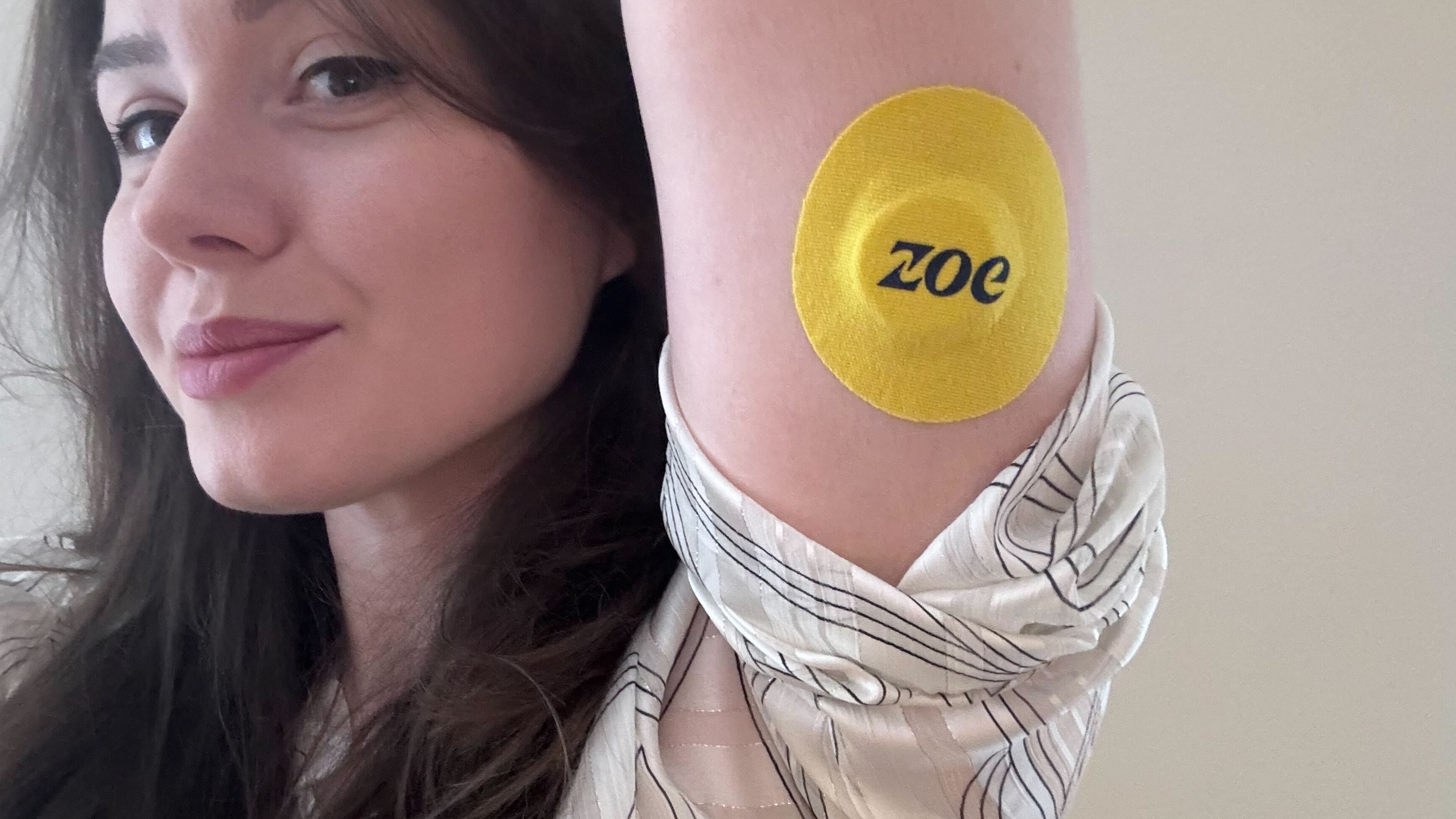
Editor's note 03/06/2024: When I first published this article I referenced a lack of peer-reviewed materials supporting Zoe, as I was unaware of the recent publication of Zoe's first peer-reviewed METHOD study. While this goes some of the ways to develop my confidence in the science, it's also worth highlighting commentary on the study from specialists like Dr. Nicola Guess of Oxford University and media such as The Guardian in the UK. The rest of this article remains as originally published.
When I first heard about Zoe and its suite of at-home gut and blood-glucose tests, I was hugely skeptical. Its combination of gut and blood testing paired with a membership-based app promise to help you “make smarter food choices for your body” by scoring different foods against your results, and offering tailored nutrition insights and recommendations.
This did little to convince me any more than the countless other nutritional programs I’ve seen over the years – once you’ve tried one health fad, you’ve tried them all, right?
However, I’ve been suffering with severe, unexplained abdominal pains, indigestion, and lethargy for the best part of two years; issues that unfortunately, our overburdened National Health Service in the UK has not been able to help with.
So, after months of being bombarded by Zoe ads, and at a point of utter desperation, I reached out to the brand to ask if I could give it a go. And, following a slightly traumatic testing experience that features blue poop, at-home blood testing, and a whole lot of food-logging, I’m incredibly glad I tried Zoe.
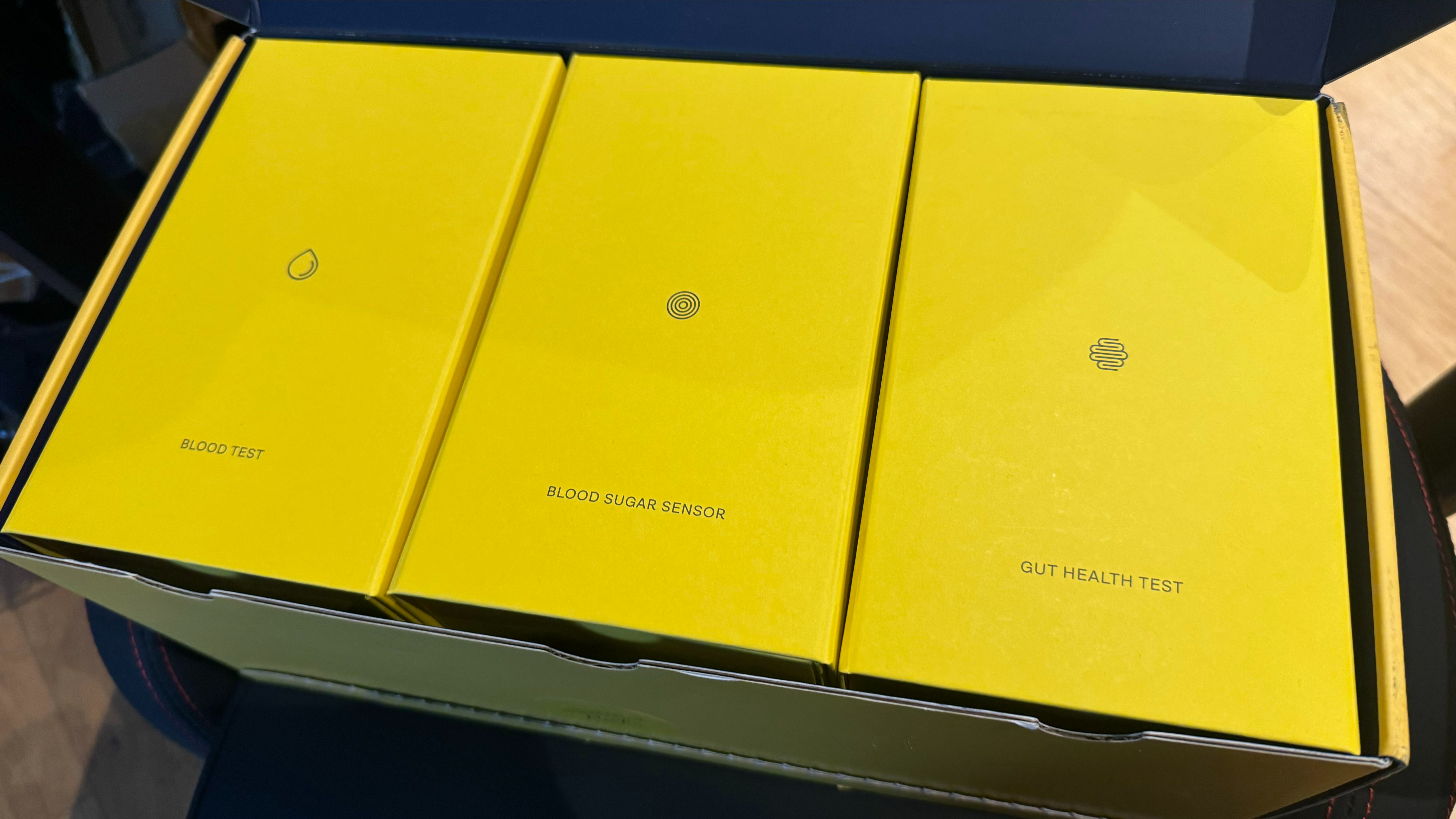
Poop blue (Da ba dee)
Since its launch back in April 2022, Zoe has caused quite a stir in the nutrition and wellness space, to a point where here in the UK at least, and certainly among tech and wellness enthusiasts, it’s almost a household name. It's not like one of the best fitness trackers or best smart rings where you can see and continually track your health metrics, either; its tests and results are a lot more involved than that.
The tests alone cost $294 / £299.99, with different membership tiers available to grant you access to Zoe’s suite of tools and wellness learning materials. Members also have access to registered nutritionists who can advise you on your meals, whether you’re eating at a restaurant, doing your weekly grocery shopping, or just looking for some inspiration.
The total cost will depend on which tier you choose to purchase, but as a loose guide the membership tiers and costs are:
Starter (4 months)
US: $294 upfront or in installments for testing, $39 per month upfront or rolling payment.
UK: £299 upfront for testing, £34 monthly rolling payment
Thrive (12 months)
US: $294 upfront or in installments for testing, $29 per month upfront or rolling payment.
UK: £299 upfront for testing, £25 monthly rolling payment. Includes one gut health retest at four months.
Thrive Plus (12 months)
US: No option
UK: £599 upfront for testing, £25 monthl rolling payment. Includes three gut health retests at four, seven and 10 months
For full disclosure, I remain dubious of the science behind the Zoe nutrition program, and especially when you factor in these lofty prices. While celebrity scientist and Zoe co-founder Tim Spector has a decorated career history to lend credence to his newest venture, there are still some huge question marks over how useful continuous glucose monitors are for non-diabetics.
Plus, between a lack of peer-reviewed studies showing the efficacy of the Zoe plan and questions surrounding how useful the information given would be for those not suffering from weight or nutrition-related health conditions, I’m not yet comfortable with wholeheartedly recommending Zoe for anyone and everyone.
That being said, in my particular case, I’ve found the whole experience enlightening, and the app underpinning the whole product is a brilliant blend of science and technology.
Its offering is pretty unique, combining key elements of two different kinds of popular nutrition programs: gut microbiome and blood-sugar testing. You begin your Zoe journey with a testing period, during which you log your meals and eat normally for two weeks while wearing a continuous glucose monitor, and you’ll also need to send the company a vial of blood, which you collect using Zoe’s at-home blood sample kit.


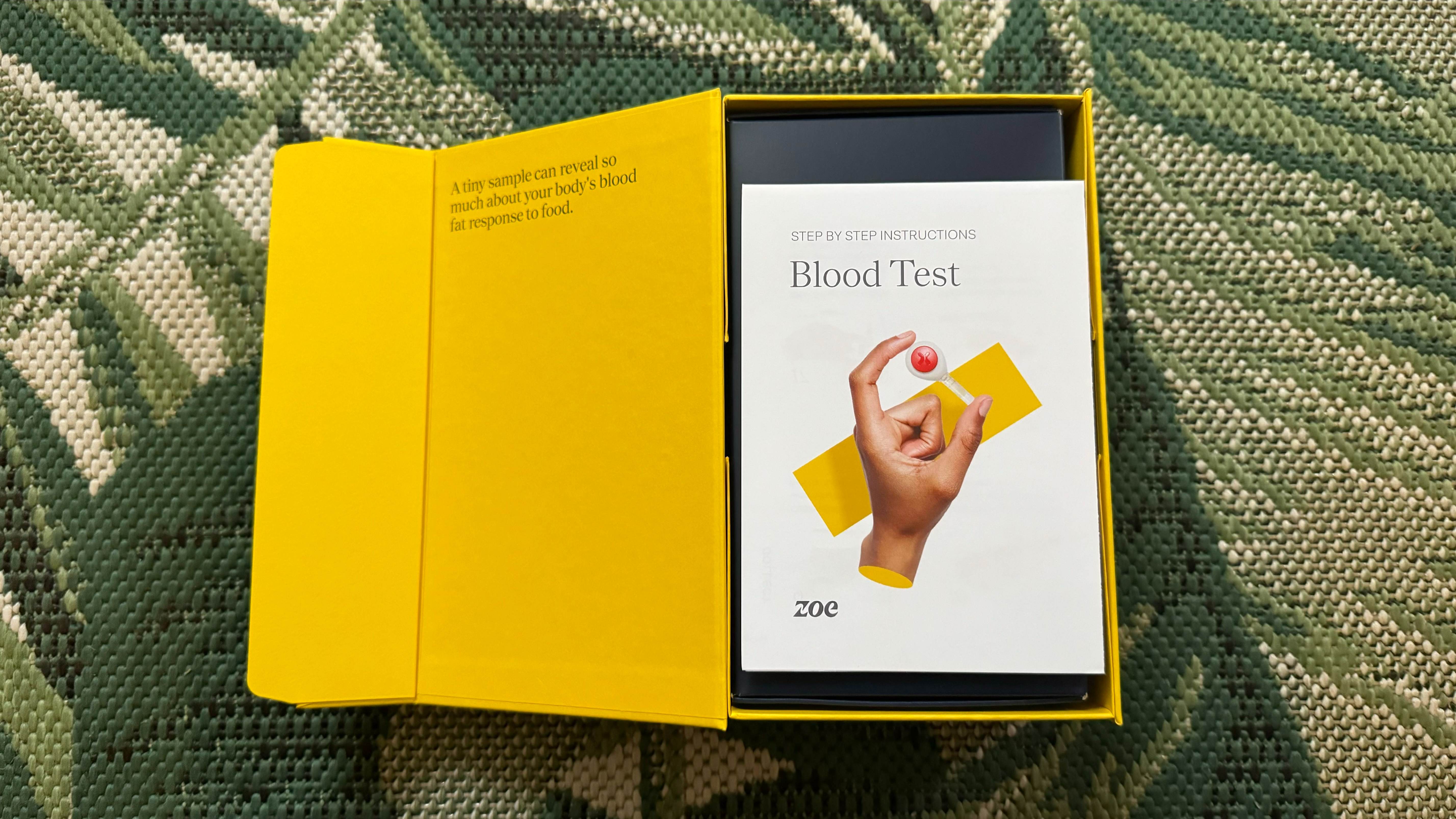


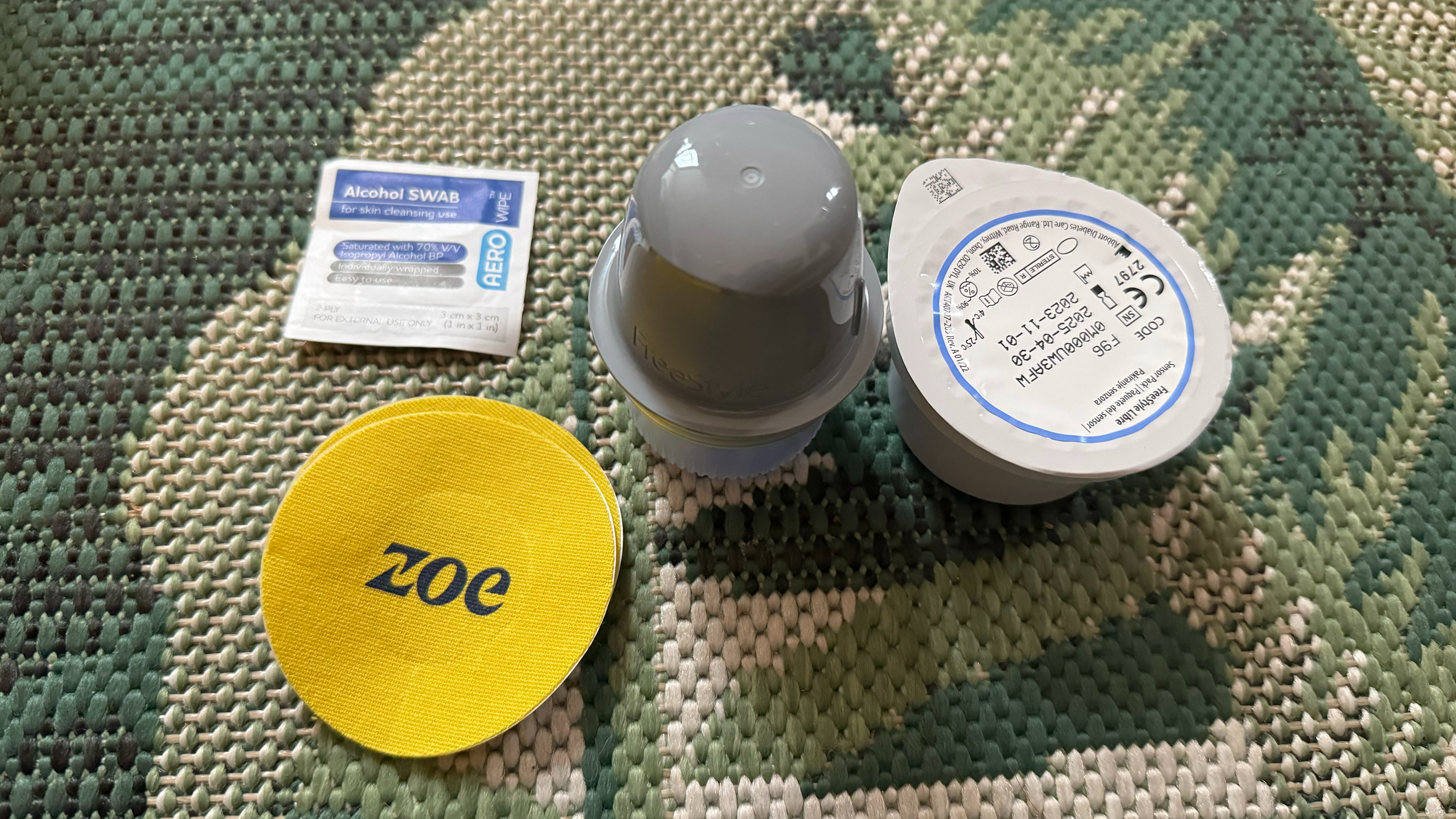
Testing doesn’t end there though; your poop is pivotal to Zoe’s testing. There’s no other way to say this, but you’ll have to defecate into the provided ‘poop hammock’, swab a sample of your stool, and send this across to the Zoe team too. Plus, you’ll have to eat two sets of two cookies that test your body's blood and gut responses, and the latter set will turn your poop blue to let you know once the food has made it through your digestive system.
All in all, it feels pretty extreme, and as someone who’s terrified of needles and very squeamish, I can’t say I had a lot of fun during this phase of exercise. However, once you’ve sent off your samples and data, the magic starts to happen.
From commode to code
When it came time for me to read my test results, I was a little floored. Not only did my results show that I had poor blood-sugar control and diet, but my microbiome score was flat-out bad.
I’d guessed my results might not be pretty, given the health difficulties I’d been facing, but to score 23/100 for my gut microbiome score as someone under 30 was pretty shocking.
This stage of the process is where the work really starts - and this is where Zoe shines. Unlike every other commitment-based lifestyle product I’ve tested, Zoe managed to keep me on track and log my daily activities thanks to some brilliant AI applications and detailed, personal insights.
I spoke with Laura Mahy, VP of Product at Zoe, to learn more about how the app forms the backbone of the Zoe experience.
“We want Zoe to be a companion, helping you make food choices for whatever moment you're in, whether you're planning your weekly shop or at a restaurant,” Mahy explains, outlining the app’s real raison d'etre.
Once your test results have been processed, the app factors in the various aspects of your profile and assigns scores to individual ingredients. These scores are measured against one another when you log a meal to give you an overall score out of 100 for every meal, with the idea being that you aim to score an average of 80 throughout the week. That’s right – it’s the delicious, sweet gamification of gut health.
Things like orange juice, which I’d been drinking daily, scored 11/100 on account of both my blood sugar control and gut health, whereas dairy products like Emmental and Mozzarella cheese scored relatively highly at 77/100 and 70/100 respectively, much to the delight of my cheese addiction.
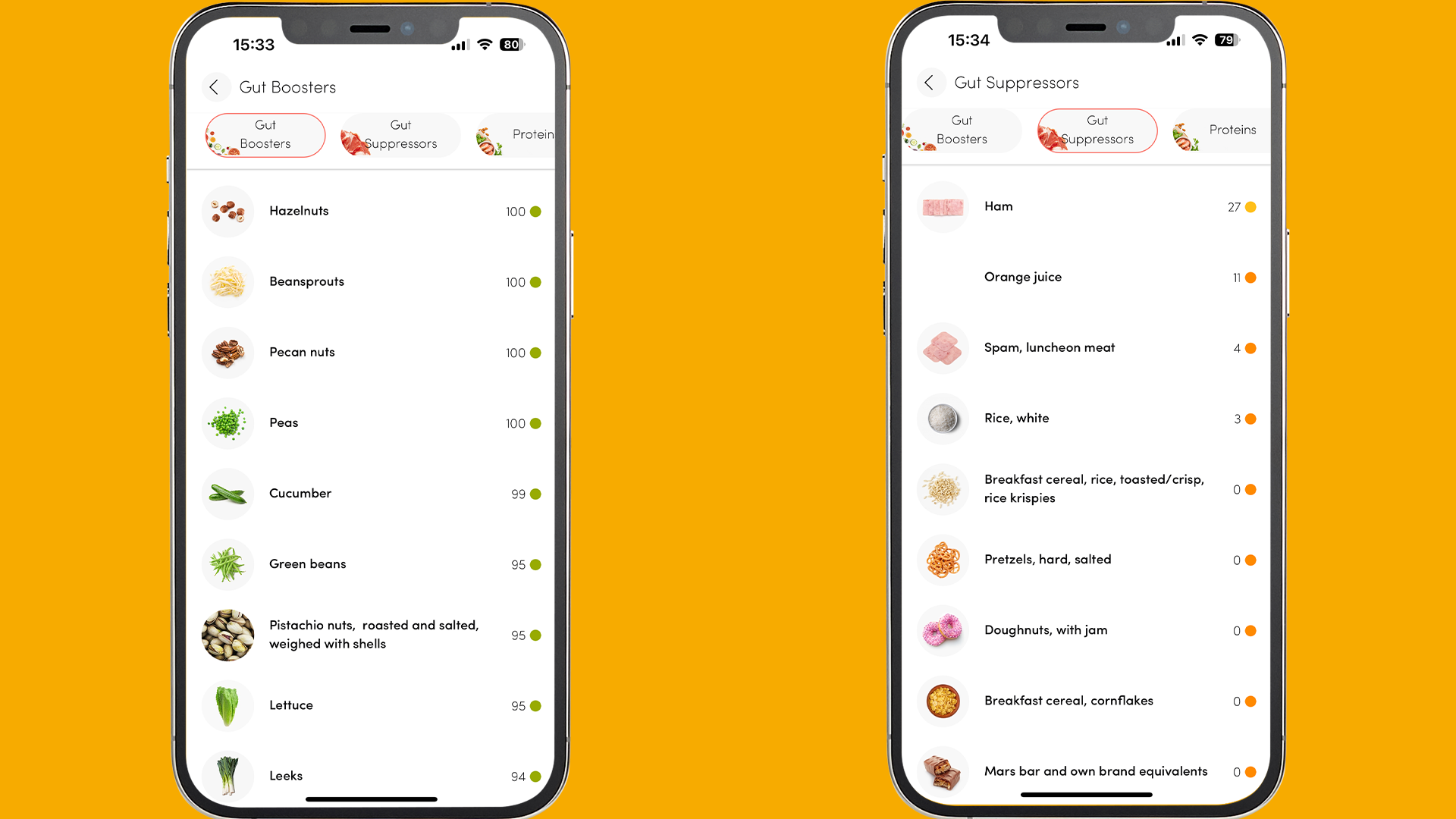
A job well-dung
If you’re anything like me, a bead of sweat rolls down your brow at the thought of manually logging every meal – and every ingredient – every single day. However, Zoe is one step ahead, leveraging a host of features to help. As well as Zoe’s recommendation algorithm, which will offer a selection of recipes to users based on their personal Zoe scores, you can scan the barcode of food in any supermarket you can scan things to find the healthiest options for you.
Most impressive and time-saving for me, however, was Zoe’s generative AI Describe My Meal feature, which allows you to detail your meal and watch as the app pulls together a full list of editable ingredients and quantities to halve the time you spend logging food.
“That’s powered by a large language learning module, and you can put in just the name of what you're eating and it can guess what's in the recipe, which means that you can get a score,” explains Mahy.
Simple though it may sound, this one feature completely changed my experience with Zoe, allowing me to very quickly and easily log my meals and get on with my day, rather than obsessing over every individual component of a meal. It’s impressively accurate, generates results quickly, and generally helped me understand why certain meals might be leaving me feeling the worse for wear.
Zoe’s combination of time-saving tools, personalization options, and information-rich learning materials goes a long way to making the membership worthwhile. That being said, it’s still pretty pricey, and making that spend worthwhile seems to be a real priority for the team at Zoe.
Mahy explains: “We spend a lot of time thinking not just about the advice that we can deliver, but how can we make that advice more specific, more personal to you and your health goals and also your living situation. Some people, like myself, have young kids; other people have a really fussy partner who will always only eat meat. People have lots of different constraints in their life.”
Saving time with AI tools really helped me commit to Zoe, meaning that I not only saw the entire program through, but that I also had a lot more time to invest in really studying my results. It became a sort of game to try to make the highest-scoring meals, and one that saw me really improve my dietary health on the whole, by inspiring me to try some new ingredients and challenging me to eat far less microwave meals.
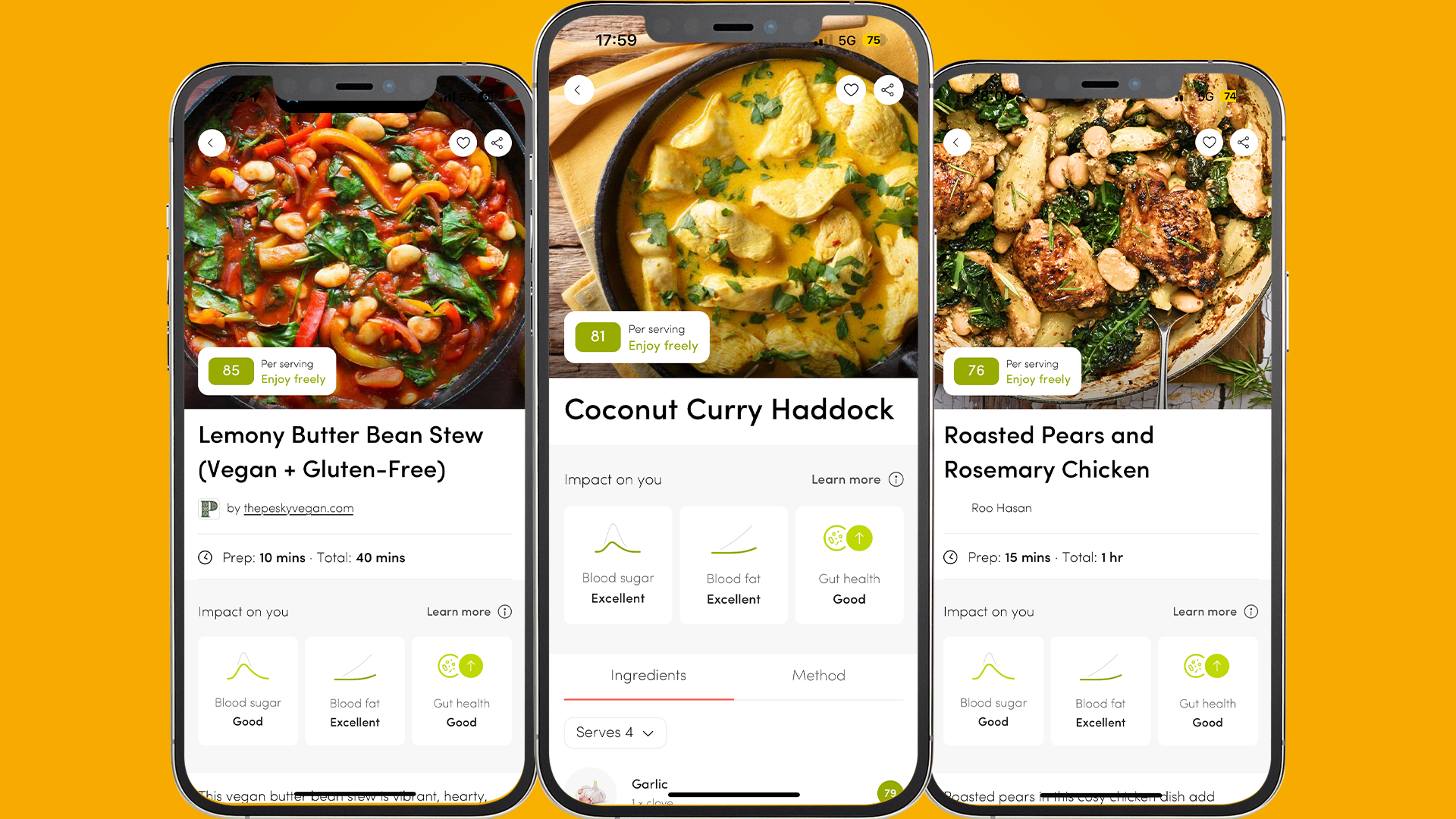
This, Mahy says, is a core principle of Zoe’s app. “It's just as important to deliver great advice as it is to ensure the adherence to it.”
Mahy says another AI tool that’s currently in Beta is the recipe assistant: “You can type in things like ‘I've got my mom coming for lunch on Sunday and she won't eat meat, and I want to try and make a good-scoring meal for everyone; please can you include my gut boosters?’ You can kind of give it quite complex instructions and then the app will come back with like a recipe for you – and if you don't like it, you can try another one.”
“We've also been experimenting with taking pictures of your fridge,” Mahy says, “so that we can help you make something with what you've got. This is a really exciting time to be building something in this space alongside all these innovations with AI.”
A royal flush for nutrition
So, the big question: has Zoe really worked for me?
Hesitantly, I’d say yes – and I’ll explain my hesitation shortly. The combination of heightened awareness of my dietary choices thanks to consistent but non-harassing pointers and interactions from the Zoe app worked incredibly well to keep me invested in the process. I like that the focus isn’t on the quantity of meals or calorie counting, but instead on pairing foods that might not work so well with my gut and blood markers with those that do.
The net result? I’m being more mindful with my eating, factoring in some of the specific trends I noticed in my food profile, and I’m also trying healthier recipes, and swapping out ingredients for better alternatives. Without a doubt, that’s a win – I’ve struggled with disordered eating – and, better yet, my abdominal pains and energy levels have started to improve. Broadly speaking, I feel better, too; I’ve got more energy, I’m sleeping better, and my abdominal pains have massively reduced to a point where I barely notice flare-ups.
However, I’ve yet to see the scores on the doors, and there are a plethora of reasons why I might be seeing a reduction in my stomach pain, from stress levels to seasonal changes. Zoe has more recently begun offering retesting kits to 12-month subscribers in the UK, and as a one-time purchase for other subscription tiers, which allows you to see how your gut health has improved – blood markers can take a long time to improve, if at all. I've yet to receive mine to compare the scores, but I'm eager to see just how much my results have changed.
What Zoe can be credited for is giving me a material impression of how the foods I eat might affect me, but a lot of the results are fairly sensible: eat less red meat, and more fruits and vegetables. Nuts, legumes and some dairy products work well for me, but carbohydrates like rice, bread and rice don’t. None of this is particularly revolutionary, barring the insights into the scales of what’s better and worse for me of these options, and when I compared my results to a friend’s they were broadly speaking pretty similar; but that’s one person, who’s a similar age and the same gender as me, so I’d expect as much.
Judging from Mahy’s roadmap for Zoe, there’s still plenty more to come, and I can absolutely see a future where programs like it are very much commonplace, but right now there are a lot of big questions that remain unanswered. As we learn more about the nature of gut health, microbiomes, glucose markers and the long-term results of Zoe plan in general, I’m hopeful that I’ll become more convinced, and able to recommend Zoe to more people – right now I’m just very grateful to have some respite from my own health issues.







